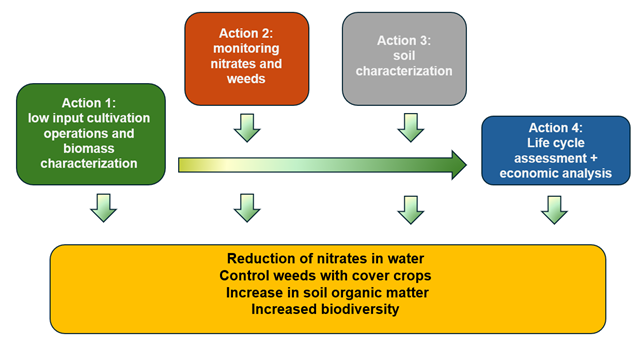FUNDING SOURCE:
PSR 2014-2020 REGION EMILIA-ROMAGNA Measure 16.1.01 - Operational groups of the European partnership for agricultural productivity and sustainability.
Total project amount: €249,979.38 - approved regional contribution: €205,672.18.
LEAD PARTNERCOORDINATOR: Fondazione per l’Agricoltura F.lli Navarra
PARTNERS IN THE OPERATIONAL GROUP:
• University of Ferrara
• CRPA Animal Production Research Center Cons. Soc. p.A.
• Gherardi Ravalli Modoni Nicola
• Tiziana Agricultural Company, owned by Preti Tiziana and Gherardi Nicola s.s.
• DINAMICA Limited Liability Consortium Company
TECHNICAL-SCIENTIFIC DIRECTORCOORDINATOR:
Giuseppe Castaldelli – Department of Life Sciences - University of Ferrara
Questo indirizzo email è protetto dagli spambots. È necessario abilitare JavaScript per vederlo.
PROJECT MANAGER:
Marco Rivaroli – Fondazione per l’Agricoltura F.lli Navarra
Questo indirizzo email è protetto dagli spambots. È necessario abilitare JavaScript per vederlo.
PROJECT OBJECTIVES:
PThe roject goalss of the plan are to define the role of soil organic matter in reducing nitrate pollution and to decrease the use of herbicides in crops, such as maize, through the adoption of conservation agricultural practices, combined with the use of cover crops and digestate, as suggested by the new National Strategic Plan for the CAP 2023-27.
This project will use field trials, where conservation agriculture practices, have been compared to traditional ones since 2017, allowing for an evaluation over a 7-year time frame. The use of cover crops and digestate will enable the assessment of their additive effect on nutrient availability and soil biodiversity.
EXPECTED RESULTS:
The expected results aim to reduce the risk of nitrate pollution in vulnerable areas by increasing soil organic matter and developing a protocol for introducing cover crops into crop rotations to progressively reduce the use of herbicide use in farming. These results align with the new National Strategic Plan 2023-27, which aims to "reduce soil erosion and degradation" through conservation agriculture practices and the use of organic amendments, and to "reduce the risk of pollution and environmental degradation" with innovative techniques aimed at minimizing inputs in the field.
This is, therefore, a priority action for environmental quality, developed through different but complementary operational lines, such as:
1. Applying conservation agriculture techniques to increase soil organic matter to reduce nitrate loss to groundwater and surface water; ,
2. Developing a protocol for using cover crops to reduce the use of pesticides, like herbicides to protect both water and soil;,
3. Applying local digestate to further increase organic matter and promote soil biodiversity.
The project also benefits from a demonstration field where different soil treatments have been applied since 2017, allowing for a 7-year snapshot of their effects at the end of the project.
The concept of biodiversity is applied here at the surface level by expanding crop rotations with the introduction of cover crops, and at the subsurface level with microbiological soil characterization. To provide a more comprehensive picture and transfer as much information as possible to the agricultural sector on the effects of the proposed agronomic practices, both economic and environmental sustainability will also be evaluated through study tools such as LCA.

DESCRIPTION OF ACTIVITIES:
Action 1: Agricultural practices to increase Soil Organic Matter and product characterization
The experimental activity will be conducted on the fields of the Fondazione Navarra, where four different agricultural practices will be implemented:
• Thesis 1: Conventional tillage with plowing at 40 cm with digestate input (traditional practices).
• Thesis 2: Minimum tillage without layer inversion with digestate input.
• Thesis 3: Conversion from traditional tillage to no-till with surface digestate application.
• Thesis 4: No-till with surface digestate application.
Action 2: Nitrate removal monitoring and weed spread prevention
The monitoring of the effects of agronomic practices on nitrate pollution prevention will involve the timing and methods of digestate distribution and its effects on nitrate pollution prevention.
Action 3: Soil characterization
This action, coordinated by CRPA, involves studying the soils present at the demonstration sites and monitoring the organic matter content and biological quality of the soil within the various demonstration theses.
Action 4: Environmental and economic sustainability assessment
The following aspects will be evaluated:
1. Sustainability indicators of environmental impacts generated by the three cultivation strategies (conventional tillage, minimum tillage, no-till).
2. Economic sustainability indicators of the proposed agronomic management systems, compared with conventional ones.
REQUESTED FINANCIAL SUPPORT:
TOTAL COST €249,988.73
% FINANCING €205,672.18





